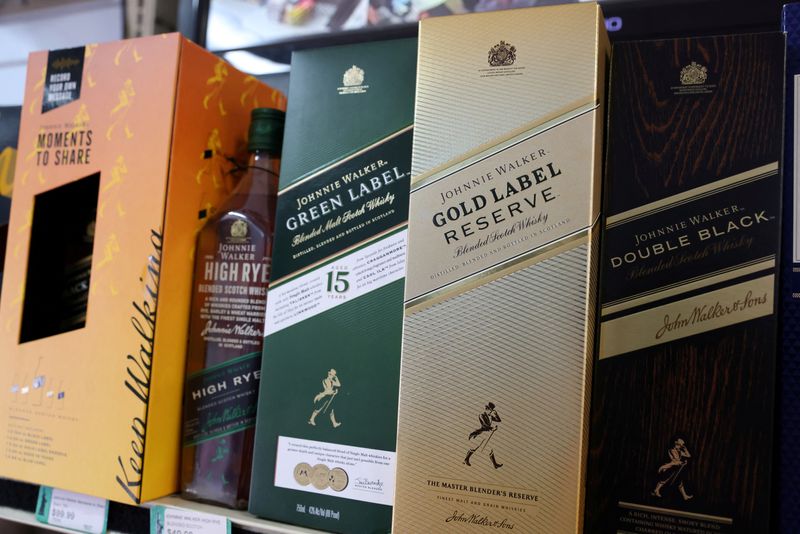By Emma Rumney
LONDON (Reuters) - Diageo (LON:DGE)'s attempt to reassure investors about its strategy in Latin America has boosted confidence among some that the world's top spirits maker can revive its performance after a profit warning, but doubts remain for others.
Investors watched closely as the maker of Tanqueray gin and Johnnie Walker whisky reported its first-half results last week after a November warning shook confidence in the company and its management led by new Chief Executive Debra Crew.
Diageo's warning was driven by a sharp decline in sales in Latin America as consumers switched to cheaper booze, leaving the company with a build up of unsold stock that it admitted only became clear at a relatively late stage.
Since the latest earnings were published, three investors told Reuters the measures Diageo is putting in place to ensure it isn't caught out in the same way again were welcome.
"The sky is a little clearer and there's a little bit more sunshine," said Johannes Hesche, a portfolio manager at Diageo investor Acatis, adding the global economic environment was also more likely to improve than get worse.
Diageo said it was taking steps to improve data collection from its trade customers in the region, such as testing digital tracking of its shipments.
It is also encouraging key distributors to allow independent stock counts at their top customers, which Diageo said would give insights into 200-300 more trade clients in its supply chain.
Diageo's shares have gained more than 3% since its half-year results, building on an earlier boost from Remy Cointreau's third quarter sales, which lifted sentiment around the prospects for spirits in the United States and China.
While they are still some way ahead of key rivals like Pernod Ricard (EPA:PERP), they remain around 9% lower than prior to the profit warning and are tailing behind a broader index of beverage industry peers.
A GOOD RETURN
Hesche said while he felt reassured they were taking the right steps to avoid mistakes being repeated, he was still not entirely confident in Diageo's management.
Diageo declined to comment on a Sky News report last week that it had started the search for a new chairman to replace Javier Ferran, whose current term ends in 2025.
None of the shareholders Reuters has spoken to since the profit warning wanted to see any management changes as a result, though three said they were still waiting for Crew to prove herself at the helm.
Crew was named in March last year as the successor to Ivan Menezes, under whose leadership Diageo's share price doubled, but ended up taking over earlier than planned after the 63-year-old died shortly before his retirement.
Concerns about Diageo have definitely eased, said Nigel Yates, a portfolio manager at AXA Investment Managers, pointing to the fact that when Latin America was excluded the company grew sales.
Performance in its biggest region, North America, was better than expected, he added, and Diageo's valuation meant investors could still make a good return even if the company grows slower than it hopes to in the medium-term.
Diageo currently trades at almost 19 times earnings, compared to almost 24 times for Remy and almost 17 times for Pernod.
CLEVER DECISIONS?
Diageo expects to deliver an improvement in organic net sales and organic operating profit growth in the second half of the year, despite economic volatility, a spokesperson said, adding that Diageo had an experienced management team.
However, some investors are sceptical about the company's ability to drive growth.
Diageo appeared to have missed an opportunity to convert drinkers in Latin America to spirits from beer for good, said Moritz Kronenberger, a portfolio manager at Germany's Union Investment, another shareholder.
It also remained to be seen whether Diageo's measures to fix issues in Latin America would pay off, he added.

Diageo should benefit from a gradually improving U.S. economy and easier comparative numbers in its previous results, said Christian Diebitsch, a fund manager at Diageo investor Heptagon Capital.
Those factors were more likely to turn around its performance than "clever management decisions", he added.